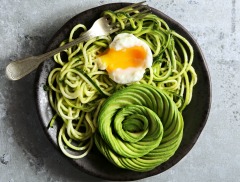Don't just meal plan... meal plan intelligently - with Meal Genius! Sign up for our free newsletter to get delicious recipes, sample meal plans and a whole lot more!
Papaya
Papayas are tropical fruits thought to be native to the Americas.
The center of the fruit is filled with numerous tiny, glistening seeds, which are edible and can also be used as a decorative garnish.
Varying in weight from half a pound to 20 pounds and in shape from round to banana-like, papayas provide a digestive enzyme called papain.
While papayas are an excellent source of beta-carotene and vitamin C, and a good source of fiber, potassium and folate, they are considered "medium" on the glycemic index and are high in sugar, so enjoy in moderation.
Glycemic Index=59
Glycemic Load=10
The Benefits
- Special diets: Autoimmune Paleo Diet, Elimination Diet, Gluten-Free Diet, Gluten-Free/Dairy-Free Diet, Grain-Free Diet, Low Acid Diet, Low FODMAP Diet, Low Histamine Diet, Low Oxalate Diet, Low Starch Diet, Paleo Diet (Light), Paleo Diet (Strict), Pescetarian Diet, Primal Diet, Vegetarian Diet, Whole Food
- Excellent Source of: VitaminA, VitaminC
- Good Source of: Fiber, Potassium, Folate
- Preferences: No Fish, No Red Meat, No Pork, No Eggs, No Shellfish, No Gluten, No Nuts, No Seeds, No Soy, No Dairy, No Poultry, No Molds, No Citrus, No Coconut, No Pseudograins, No Corn, No Yeast, No Peanuts, No Nightshade, No Legumes, No Grains, Low Carbohydrate, Low Cholesterol, Low Fat, Low Sodium, Low Saturated Fat
Selecting and Storing
Choose papayas with smooth skin that are yellow to yellow-orange and yield to slight pressure. Ripe papayas should be placed in a plastic bag and stored in the refrigerator for use within a week.









